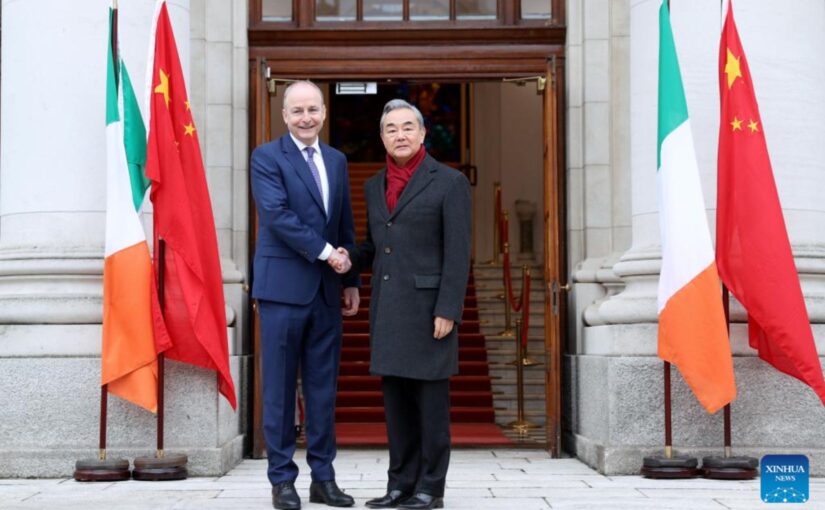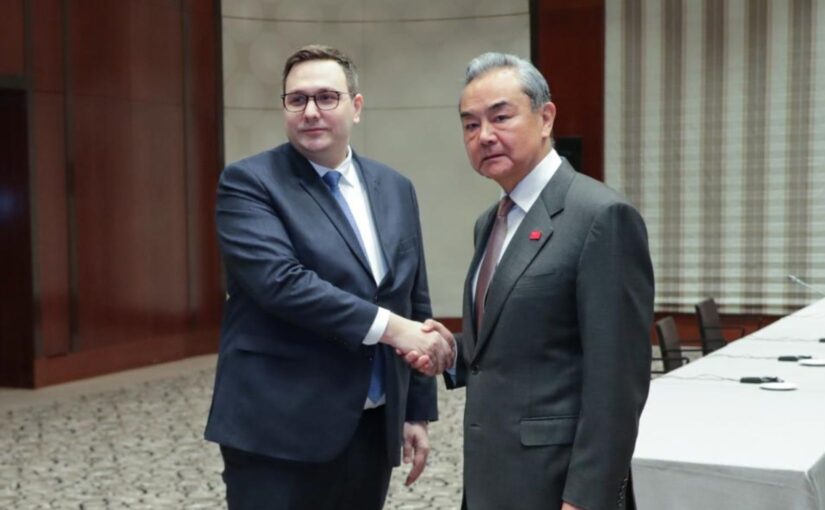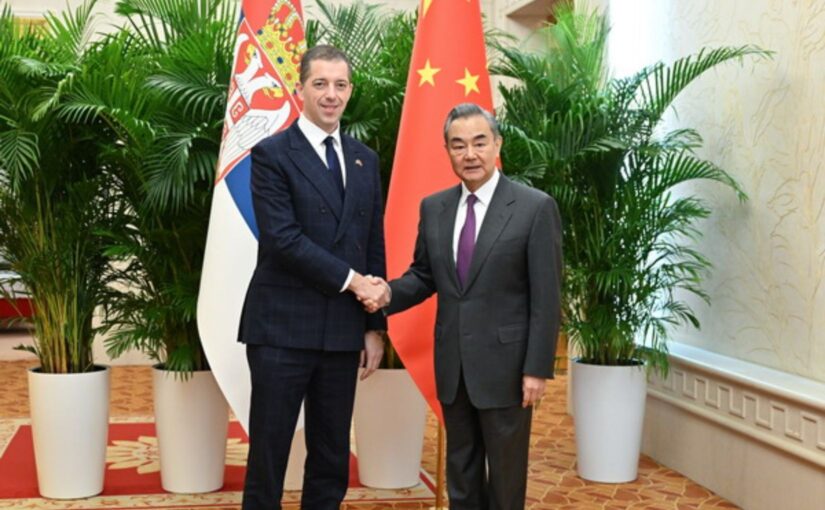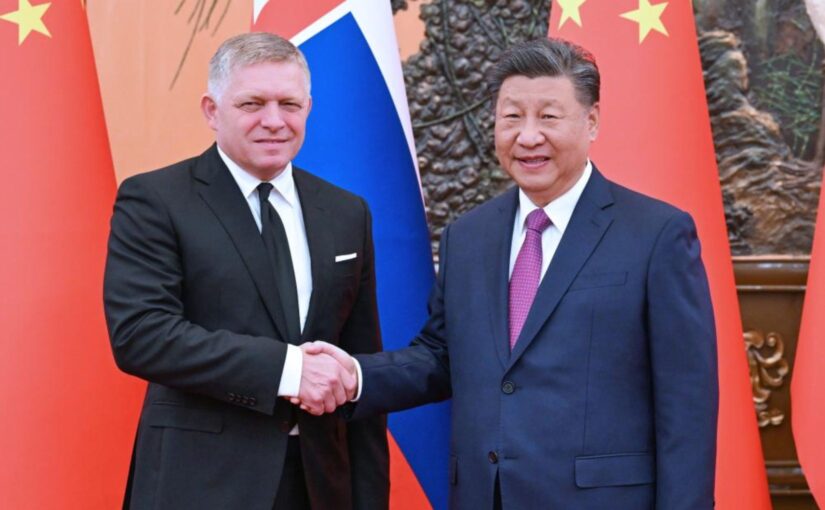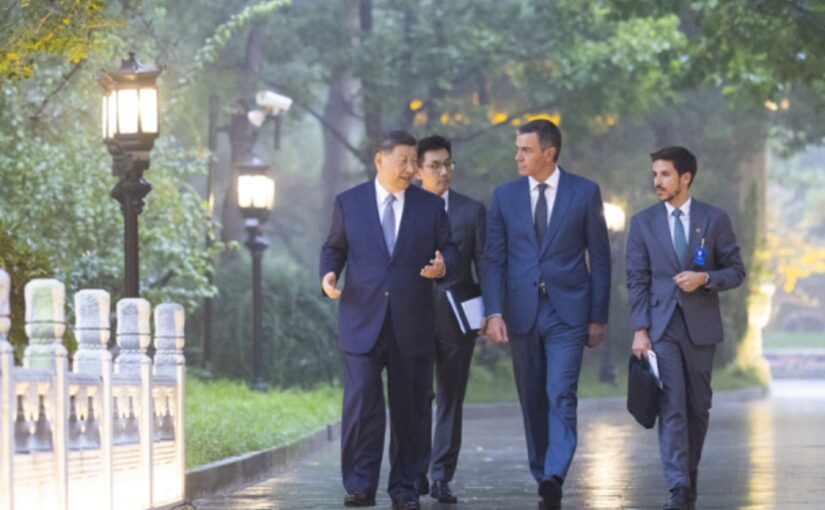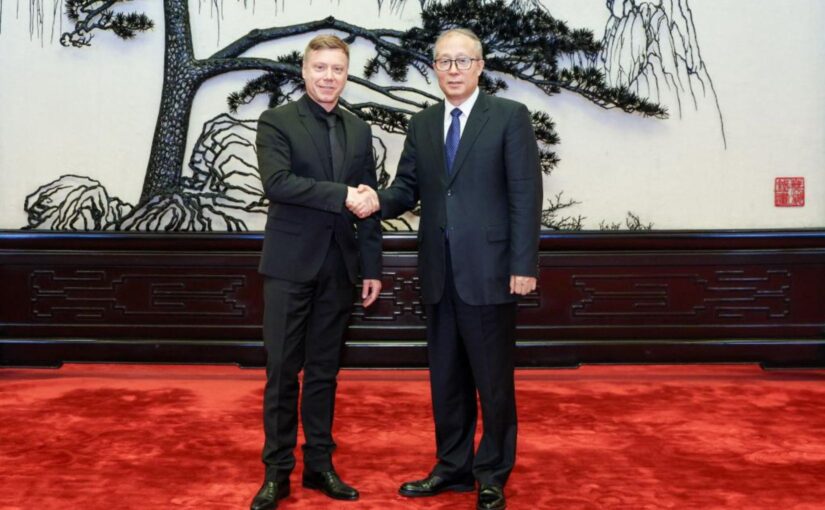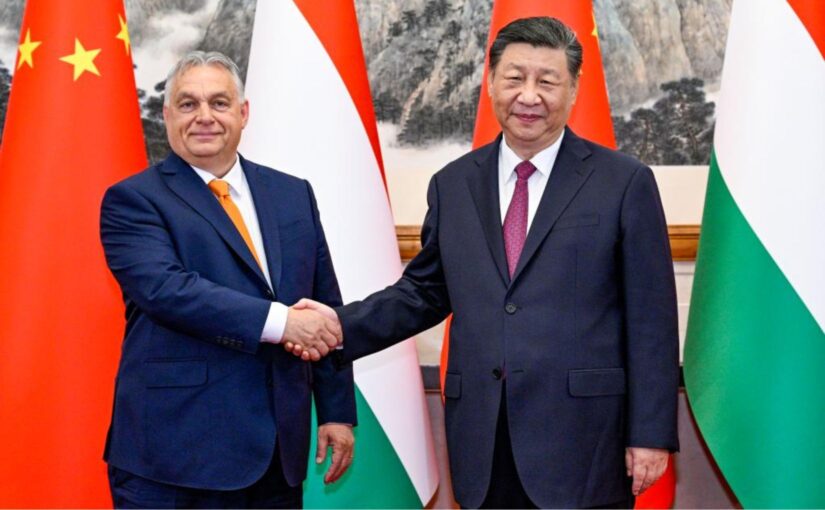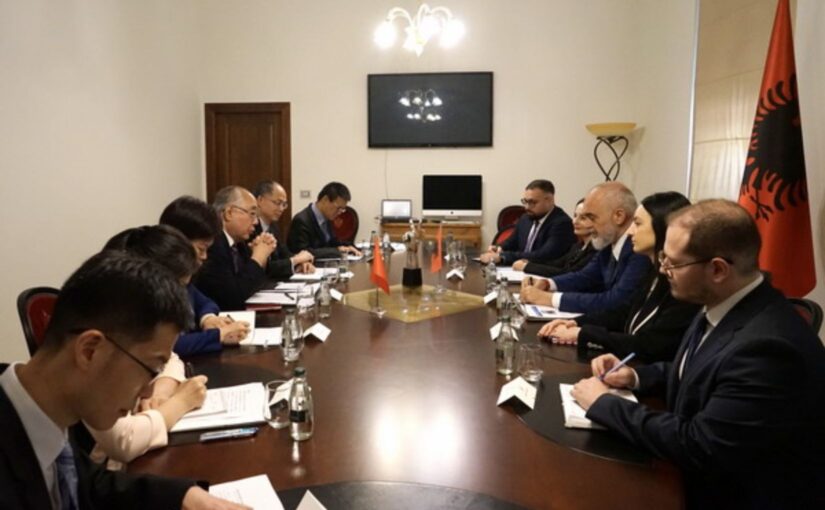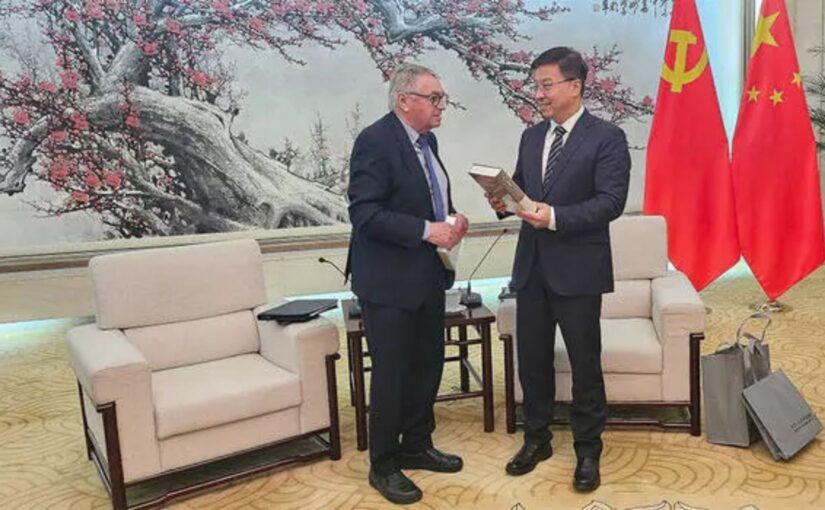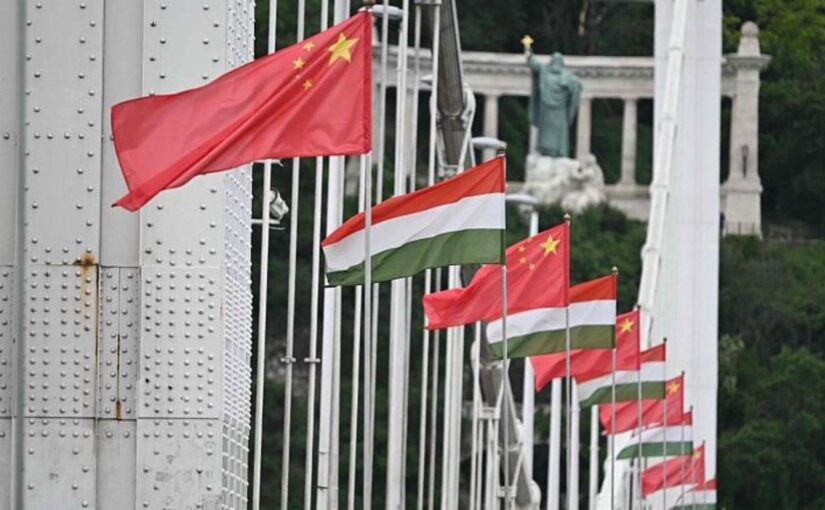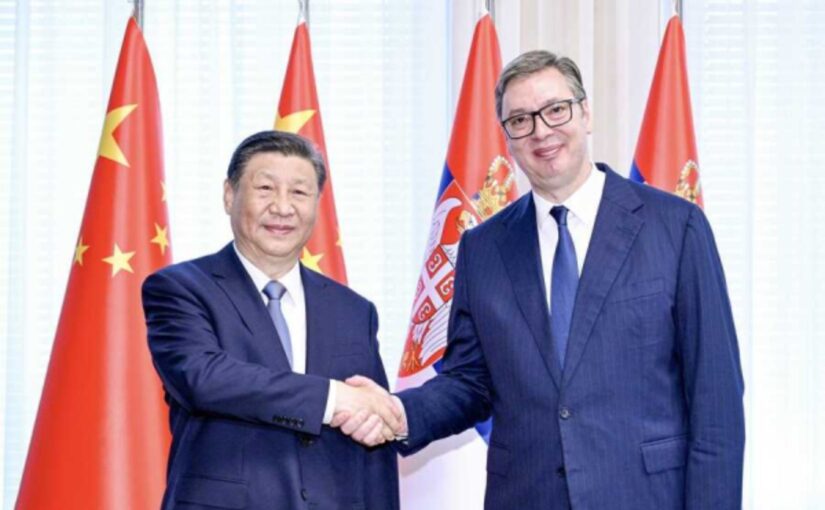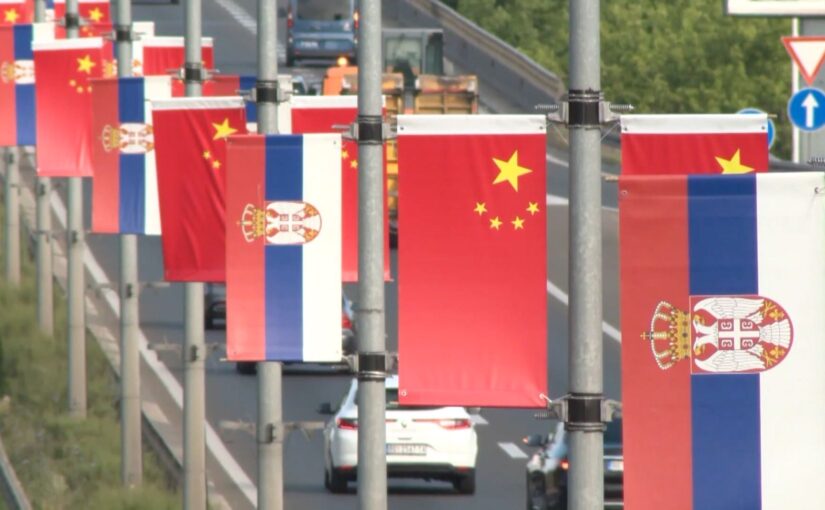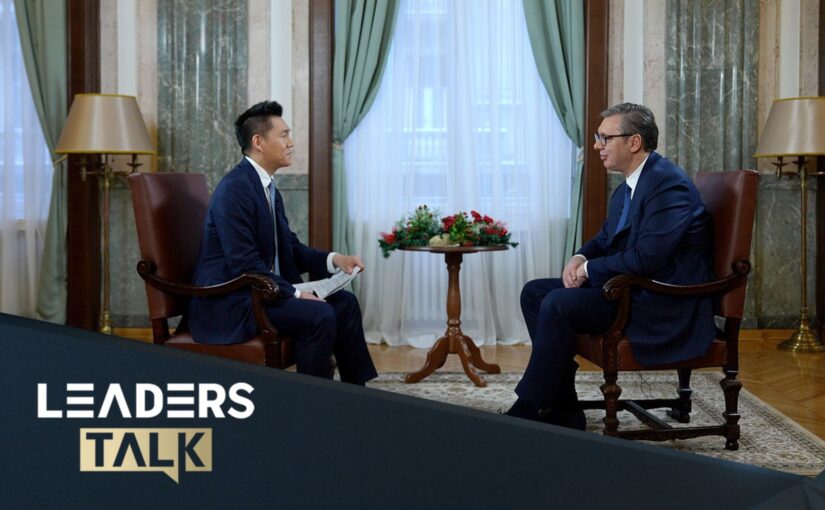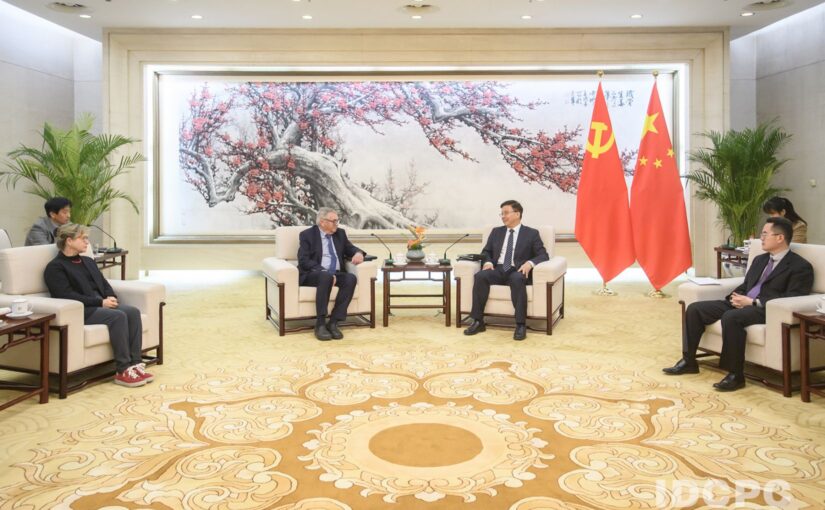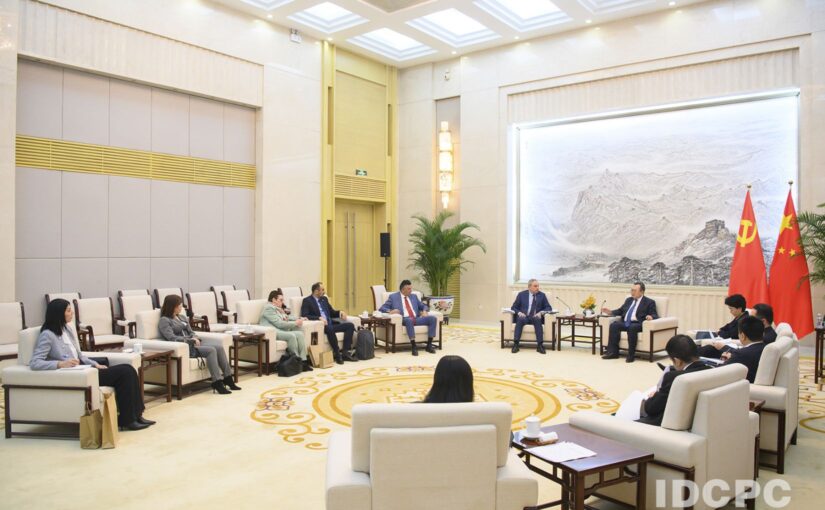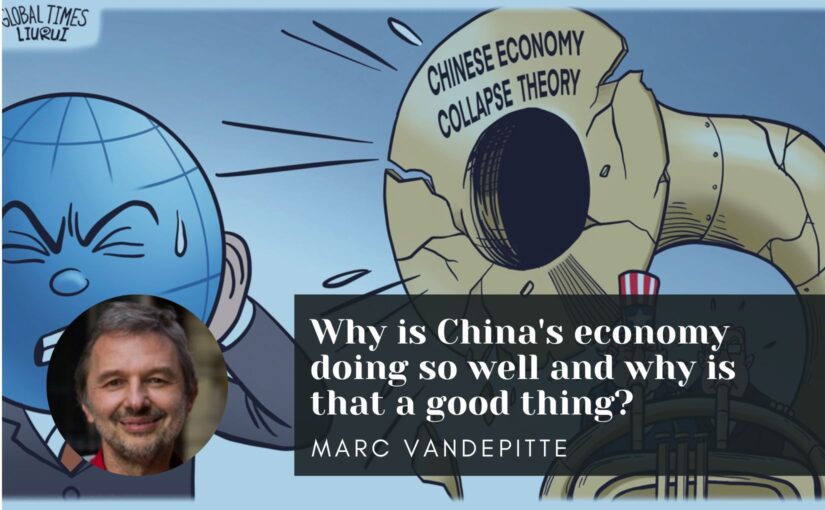Chinese President Xi Jinping paid a state visit to Serbia from May 7-8, 2024, as the second leg of his European tour, which also took him first to France and subsequently to Hungary. His last visit to Serbia was in 2016.
Reporting his arrival on the evening of May 7, Xinhua News Agency reported that the “Serbian Air Force sent two fighter jets to escort Xi’s plane after it entered the country’s airspace. The Chinese president was warmly welcomed by Serbian President Aleksandar Vučić and his wife, Tamara Vučić at Belgrade Nikola Tesla Airport. Serbian children presented flowers to Xi and his wife, Peng Liyuan, and waved the national flags of China and Serbia. Serbian people dressed in national costumes sang and danced to welcome them.”
In an arrival statement, President Xi said that China and Serbia enjoy profound traditional friendship.
“Our bilateral relationship has stood the test of the changing international environment and become a fine example of state-to-state relations. Since the establishment of the comprehensive strategic partnership in 2016, the bilateral relationship has realised leapfrog development, and achieved historic results. The two countries are bound by rock-solid political mutual trust and have seen fruitful results in high quality Belt and Road cooperation.
“Our ironclad friendship has taken deeper roots in the heart of the two peoples. China and Serbia have rendered each other firm support on issues concerning our respective core interests and major concerns. We have jointly upheld international fairness and justice and contributed our share to promoting world peace and development. Cooperation between the two countries is rooted in the principle of equality and mutual benefits.”
The two heads of state held talks on the morning of May 8, in which they announced the decision to deepen and elevate China-Serbia comprehensive strategic partnership and build a China-Serbia community with a shared future in the new era. Prior to this, President Vučić held a grand welcoming ceremony for President Xi, during which some 15,000 Serbian people waved national flags of China and Serbia to express the warmest welcome to the Chinese head of state.
In the talks, President Xi said that the China-Serbia ironclad friendship is characterised by profound historical roots, solid political foundation, extensive common interests and strong popular support. Actions speak louder than words. China will stand shoulder to shoulder with Serbia, share weal and woe like passengers in the same boat, carry forward the spirit of the ironclad friendship, maintain and grow their friendship, and jointly safeguard fundamental and long-term interests of the two countries.
President Xi stressed that Serbia is China’s first comprehensive strategic partner in Central and Eastern Europe. Under the new circumstances, Serbia has become the first European country to build with China a community with a shared future. The China-Serbia community with a shared future in the new era is an upgrade of the ironclad friendship between China and Serbia. It also represents their common values and objectives, namely, joint pursuit of development, win-win corporation and mutual success. These are the common aspirations of China, Serbia, and all countries that are committed to independence, peace, and development.
China supports Serbia in upholding independence and pursuing a development path suited to its national conditions and supports its efforts in safeguarding national sovereignty and territorial integrity.
With the China-Serbia Free Trade Agreement set to take effect on July 1 this year, the high-standard mutual opening up between China and Serbia will surely enter a new stage. China will continue to import more high-quality agricultural specialties from Serbia. It will invite 300 young Serbians to China on study and exchange programs in the next three years.
China will support 50 young Serbian scientists in taking part in scientific research exchanges in China in the next three years. It is ready to work with Serbia to strengthen cooperation on artificial intelligence (AI) and endeavour to ensure humanity properly develop and utilise AI.
It is important for China and Serbia to jointly reject hegemonism and power politics, and oppose bloc politics or bloc confrontation. The two sides should join hands to uphold the purposes and principles of the UN Charter, practice true multilateralism, and promote international fairness and justice.
President Vučić extended the warmest welcome to President Xi and noted that China is Serbia’s most sincere friend. Although Serbia is a small country, China always fully respects its sovereignty and territorial integrity, and provides valuable support for its economic and social development. President Xi is a great world leader. Under his strong leadership, China has made remarkable achievements. It has become a beacon of development and progress of the world and is playing an increasingly important leading role in international affairs. The Communist Party of China seeks to enhance the well-being of not only the Chinese people, but also people across the world. The Serbian people are full of gratitude and respect for China, especially for President Xi, and feel truly proud to be an ironclad friend to such a great nation. Serbia firmly supports China’s legitimate position on issues concerning its core interests including on Taiwan. There is but one China in the world. Serbia will, without hesitation, continue to unswervingly provide China with firm support.
After the talks, the two Presidents signed the Joint Statement on Deepening and Elevating the Comprehensive Strategic Partnership and Building a China-Serbia Community with a Shared Future in the New Era. They also witnessed the exchange of multiple cooperation documents, including on Belt and Road cooperation, green development, digital economy, e-commerce, infrastructure, economic and technical cooperation, information and communication, agri-food, and the media.
The detailed joint statement signed by the two presidents commits both countries to the defence of their respective core interests.
The Serbian side reiterated that the development of friendly relations with the People’s Republic of China is one of the main pillars of Serbia’s foreign policy. It reiterates its firm support for the one-China principle, that there is only one China in the world, that Taiwan is an inalienable part of China’s territory, that the Government of the People’s Republic of China is the sole legitimate government representing the whole of China, that it opposes any form of “Taiwan independence” and that it opposes interference in China’s internal affairs, that it will not engage in any form of official exchanges with the Taiwan authorities, and that it firmly supports all efforts made by the Chinese government to realise national reunification.
Both sides oppose the imposition of any formula on the final status of Kosovo. All parties concerned should reach a mutually acceptable solution through dialogue and consultation within the framework of United Nations Security Council Resolution 1244. In doing so, Serbia’s sovereignty, independence and territorial integrity must be fully respected. China supports the efforts of the Republic of Serbia to find a compromise in a peaceful manner during negotiations with representatives of the Provisional Institutions of Self-Government of Kosovo and calls for the implementation of all agreements reached at the Belgrade-Pristina dialogue and the effective protection of the religious and cultural heritage of the region. (Kosovo occupies a special place in the history of Serbia and in particular of the Serbian Orthodox church.)
Reflecting the global trend towards dedollarisation, the two sides are willing to strengthen financial cooperation, support the opening of the Serbian Renminbi (RMB) Clearing Bank as soon as possible, promote the use of local currency settlement in bilateral trade and investment, and encourage financial institutions of the two countries to provide financing support and financial services for trade and investment cooperation.
The two sides agreed that AI (artificial intelligence) should adhere to the principle of attaching equal importance to development and security, bridge the intelligence gap, jointly do a good job in risk prevention, and explore the formation of an international governance framework for AI with the United Nations as the main channel of communication. The two sides are willing to strengthen policy coordination in the field of artificial intelligence, establish relevant dialogue mechanisms, deepen relevant practical cooperation, and jointly promote artificial intelligence technologies. The Serbian side welcomes the Global AI Governance Initiative announced by President Xi Jinping as well as China’s efforts to strengthen the rights of developing countries in global AI governance.
Both sides agreed to jointly develop new productive forces in the light of local conditions, build high-tech industrial cooperation projects, and encourage and promote investment cooperation to this end. They agreed to deepen cooperation in the field of space science and technology. China welcomes the Serbian side to join the International Lunar Research Station.
They further stressed the importance of continuously deepening cooperation in science and technology innovation and will actively promote more practical results in the exchange of young scientists, poverty alleviation through science and technology, technology transfer, joint research, and joint construction of scientific research platforms, and welcomed the signing of the Memorandum of Understanding on Cooperation in Poverty Alleviation through Science and Technology. China welcomes more young Serbian scientists to engage in short-term scientific research in China.
Both countries believe that the Hungarian-Serbian railway modernisation project is of great significance to strengthening Serbian and regional connectivity and that it opens up new prospects for facilitating the flow of people and expanding commodity circulation and economic exchanges in the region. The two sides spoke highly of the achievements made in the construction of the Serbian section of the railway and will continue to work hard to promote the completion of the construction of the section on schedule and contribute to improving the level of regional connectivity.
Following the signing of the joint statement and the various agreements, the two leaders met the press.
President Xi noted that in 2016, he paid a state visit to Serbia and experienced the warm hospitality of the Serbian leadership and people. He said that it is a fond memory he still cherishes today, and coming back after eight years, he is heartened to see that, under the leadership of President Vučić, Serbian economic and social development has gained a strong momentum, its national strength and international standing have risen markedly, and the people’s standard of living has kept increasing.
China supports Serbia in upholding its independence and following the development path that suits its own conditions. China also supports Serbia’s efforts to safeguard sovereignty and territorial integrity on the Kosovo issue.
President Xi pointed out that a review of history shows that China-Serbia friendship is, “forged through our extraordinary fight together to promote world peace and development, and with the blood and lives of the two peoples. Looking to the future, the building of a China-Serbia community with a shared future in the new era is a strategic choice made by the two sides. It aims to meet the aspirations of the Chinese and Serbian people for a better life and will be underpinned and sustained by their firm support and extensive participation.”
At the welcoming banquet hosted by President Vučić that followed, Xi Jinping noted that the Chinese people have always cherished a special bond of friendship with Serbia.
“The Yugoslav film The Bridge and the song Bella Ciao, which evoke strong patriotic and anti-fascist sentiments, have been immensely popular in China through the years and became my companion in my youthful days. Other household names in China include athletes Novak Djokovic and Nikola Jokic, and movie director Emir Kusturica.”
(Bella Ciao is originally an Italian song, but such is its popularity and fame in progressive circles that it was chosen as the theme song of The Bridge, a 1969 Yugoslav film depicting the heroic struggle of the communist-led partisans against the Nazi occupation. The film was imported into China, and dubbed into Chinese, in 1977, the year of President Tito’s state visit. Both the film and song became hugely popular in China.)
The following articles were originally published on the website of the Chinese Foreign Ministry and by People’s Daily. The Joint Statement was published in Chinese. It has been machine translated and lightly edited by us.
Arrival Statement by H.E. Xi Jinping at Belgrade Nikola Tesla Airport, Serbia
May 7 (MFA) — It gives me great pleasure to pay a state visit to the Republic of Serbia at the warm invitation of President Aleksandar Vučić. On behalf of the Chinese government and people, I would like to extend heartfelt greetings and best wishes to the friendly government and people of Serbia.
China and Serbia enjoy profound traditional friendship. Our bilateral relationship has stood the test of changing international environment and become a fine example of state-to-state relations. Since the establishment of the comprehensive strategic partnership in 2016, the bilateral relationship has realized leapfrog development, and achieved historic results. The two countries are bound by rock-solid political mutual trust, and have seen fruitful results in high quality Belt and Road cooperation. We have agreed on comprehensive mutual visa exemption, opened direct flights, and signed a free trade agreement. People-to-people exchanges are becoming more robust. Our ironclad friendship has taken deeper roots in the heart of the two peoples. China and Serbia have rendered each other firm support on issues concerning our respective core interests and major concerns. We have jointly upheld international fairness and justice, and contributed our share to promoting world peace and development. Cooperation between the two countries is rooted in the principle of equality and mutual benefits. It serves the fundamental and long-term interests of both countries, provides strong momentum for our respective development and rejuvenation, brings benefits to the two peoples, and contributes to the building of a community with a shared future for mankind.
Standing at a new historical starting point, China will work with Serbia to jointly stay committed to the original aspiration and forge ahead together to open up a new vista in China-Serbia cooperation with stronger momentum, greater scope, and higher quality. I look forward to taking this visit as an opportunity to have in-depth exchange of views with President Vučić on the bilateral relationship and other issues of mutual interest, renew friendship, plan for cooperation, explore development, and draw up a new blueprint for the development of bilateral relations. I am confident that this visit will be a fruitful one and will open up a new chapter in China-Serbia relations.
President Xi Jinping Holds Talks with President Aleksandar Vučić of Serbia
May 8 (MFA) — On the morning of May 8 local time, President Xi Jinping held talks with Serbian President Alexandar Vučić at the Palace of Serbia in Belgrade. The two Presidents announced the decision to deepen and elevate China-Serbia comprehensive strategic partnership and build a China-Serbia community with a shared future in the new era.
The sun shines brightly in Belgrade in May. In front of the Palace of Serbia, the national flags of China and Serbia flutter in the wind, and the guard of honor lined up for the occasion. As President Xi Jinping and Madame Peng Liyuan arrived, they were warmly received by President Aleksandar Vučić and Madame Tamara Vučić.
President Vučić held a grand welcoming ceremony for President Xi. After the two Presidents came to the viewing stand together, the military band played the national anthems of the two countries, and a 10-gun salute was fired. President Xi, accompanied by President Vučić, reviewed the guard of honor. The two Presidents greeted and shook hands with the delegation members of the other side.
Accompanied by President Vučić, President Xi stepped out onto the platform of the Palace of Serbia. On the square in front of the Palace, 15,000 Serbian people were waving national flags of China and Serbia to express the warmest welcome to President Xi. President Xi waved to the crowd, which burst into jubilant, prolonged applause and cheers.
After the welcoming ceremony, the two Presidents had a restricted session followed by a plenary meeting.
President Xi expressed his delight to pay another visit to the beautiful country of Serbia in a span of eight years after the many invitations extended by President Vučić. President Xi said that he was deeply touched when he was greeted at the airport by President Vučić together with many senior government officials who held a grand welcoming ceremony for his visit. He was deeply moved by the genuine friendliness toward China from the Serbian people who are good friends of the Chinese people.
President Xi stressed that the ironclad friendship between China and Serbia has stood the test of the changing international landscape. Such friendship is characterized by profound historical roots, solid political foundation, extensive common interests and strong popular support. Over the past few years, under the leadership of the two Presidents, the bilateral relationship has leapfrogged with historic progress. Since the establishment of a comprehensive strategic partnership in 2016, in particular, the bilateral relationship has been enriched in substance and expanded in scope. It has become an example for China’s friendly relations with other European countries. Actions speak louder than words. China will stand shoulder to shoulder with Serbia, share weal and woe like passengers in the same boat, carry forward the spirit of the ironclad friendship, maintain and grow their friendship, and jointly safeguard fundamental and long-term interests of the two countries. As the two sides pursue their respective national development and revitalization, China will join hands with Serbia to advance the building of a community with a shared future in the new era.
President Xi stressed that Serbia is China’s first comprehensive strategic partner in Central and Eastern Europe. Their bilateral cooperation has injected strong impetus into their respective development and rejuvenation, and brought tangible benefits to the two peoples. Under the new circumstances, Serbia has become the first European country to build with China a community with a shared future. This speaks volumes about the strategic, special and high-level China-Serbia relations. The China-Serbia community with a shared future in the new era is an upgrade of the ironclad friendship between China and Serbia. It also represents their common values and objectives, namely, joint pursuit of development, win-win corporation and mutual success. These are the common aspirations of China, Serbia, and all countries that are committed to independence, peace and development. By building a China-Serbia community with a shared future in the new era, the two sides should keep deepening and expanding high-quality Belt and Road cooperation and collaboration between China and Central and Eastern European countries, thus contributing to their respective modernization.
First, highlighting the strategic nature of the bilateral relationship and keeping to its general direction. China supports Serbia in upholding independence and pursuing a development path suited to its national conditions, and supports its efforts in safeguarding national sovereignty and territorial integrity. The two sides should continue to offer each other firm support, deepen strategic cooperation, and safeguard their respective political security and fundamental interests.
Second, staying committed to practical cooperation and delivering for the two peoples. High-quality Belt and Road cooperation between China and Serbia has achieved remarkable results. The two sides should steadily advance cooperation in traditional areas such as transportation and energy infrastructure, make sure the entire Serbian section of the Belgrade-Budapest railway go into operation as scheduled, jointly operate well their major cooperation projects, create more small and beautiful livelihood projects, and continue to generate positive economic and social impacts. With the China-Serbia Free Trade Agreement set to take effect on July 1 this year, the high-standard mutual opening up between China and Serbia will surely enter a new stage. China will continue to import more high-quality agricultural specialties from Serbia. It will invite 300 young Serbians to China on study and exchange programs in the next three years. China welcomes the opening of direct flights from Belgrade to Shanghai by Serbia so as to comprehensively deepen people-to-people exchanges.
Third, opening up new prospects of cooperation with a focus on the innovation dimension in bilateral relations and making innovation cooperation a new growth driver in the relationship. China will support 50 young Serbian scientists in taking part in scientific research exchanges in China in the next three years. It is ready to work with Serbia to strengthen cooperation on artificial intelligence (AI) and endeavor to ensure humanity properly develop and utilize AI. It is important for China and Serbia to jointly reject hegemonism and power politics, and oppose bloc politics or bloc confrontation. The two sides should join hands to uphold the purposes and principles of the U.N. Charter, practice true multilateralism, and promote international fairness and justice.
President Vučić extended the warmest welcome to President Xi and noted that China is Serbia’s most sincere friend. Although Serbia is a small country, China always fully respects its sovereignty and territorial integrity, and provides valuable support for its economic and social development. President Xi is a great world leader. Under his strong leadership, China has made remarkable achievements. It has become a beacon of development and progress of the world and is playing an increasingly important leading role in international affairs. The Communist Party of China seeks to enhance the well-being of not only the Chinese people, but also people across the world. The Serbian people are full of gratitude and respect for China, especially for President Xi, and feel truly proud to be an ironclad friend to such a great nation. Serbia firmly supports China’s legitimate position on issues concerning its core interests including on Taiwan. There is but one China in the world. Serbia will, without hesitation, continue to unswervingly provide China with firm support.
President Vučić noted that China’s investment in and cooperation with Serbia have greatly facilitated the latter’s economic and social development and improved Serbian people’s living standards. Since 2016, in particular, thanks to the personal commitment and support by President Xi, the HBIS Smederevo steel plant has had immensely positive socioeconomic impacts. The transformative changes that had taken place in the steel plant’s development prospects have also boosted the confidence and raised the hope of the people. Serbia’s future is closely linked with China. Serbia looks forward to intensifying exchanges with China in all areas and at all levels, and to strengthening cooperation with China in various fields including infrastructure, new energy, innovation, artificial intelligence and people-to-people and cultural exchanges. Serbia will actively advance high-quality Belt and Road cooperation with China, and work to ensure that the Serbian sector of the Belgrade-Budapest railway will be completed as planned. Serbia welcomes investment cooperation from more Chinese businesses and looks forward to opening more direct flights. Building on the entry-into-force of the bilateral Free Trade Agreement, Serbia is ready to expand economic and trade cooperation with China. The announcement on deepening and elevating the comprehensive strategic partnership and building a China-Serbia community with a shared future in the new era marks a new milestone in the history of this bilateral relationship. Serbia firmly supports and will actively participate in the Global Development Initiative, the Global Security Initiative and the Global Civilization Initiative put forth by President Xi. Serbia will stay in close strategic coordination with China in multilateral fora, jointly oppose hegemonism and power politics, uphold the purposes of the U.N. Charter, and defend international fairness and justice.
After the talks, the two Presidents signed the Joint Statement on Deepening and Elevating the Comprehensive Strategic Partnership and Building a China-Serbia Community with a Shared Future in the New Era. The two Presidents also witnessed the exchange of multiple cooperation documents including on Belt and Road cooperation, green development, digital economy, e-commerce, infrastructure, economic and technical cooperation, information and communication, agri-food, and the media.
The two Presidents had a joint meeting with the press.
At noon, President Vučić and Madame Tamara Vučić hosted a grand welcoming banquet in honor of President Xi and Madame Peng Liyuan at the Palace of Serbia.
Cai Qi and Wang Yi, among others, were present at these events.
Joint Statement of the People’s Republic of China and the Republic of Serbia on Deepening and Enhancing the Comprehensive Strategic Partnership and Building a China-Serbia Community with a Shared Future in the New Era
At the invitation of President of the Republic of Serbia Aleksandar Vučić, President Xi Jinping of the People’s Republic of China paid a state visit to the Republic of Serbia on May 7-8, 2024.
The two heads of state held talks in a warm and friendly atmosphere and had an in-depth exchange of views on China-Serbia relations, deepening all-round cooperation between the two countries, jointly building the Belt and Road Initiative (BRI), China-CEEC (Central and East European Countries) cooperation, China-EU relations, and international and regional issues of common concern, and reached broad consensus.
The two sides agreed that China and Serbia cherish each other’s solid traditional friendship and close cooperation in specific fields, and that coordination and cooperation in multilateral fields have been fruitful, and that bilateral relations have broad prospects for development. Although the two countries have different histories, cultures, and national conditions, they both uphold the spirit of openness and cooperation, adhere to the principles of fairness and justice, are committed to the happiness of the people and the prosperity of the country, and are committed to the noble cause of peaceful development of humanity. Serbia supports efforts to build a community with a shared future for humanity and stands ready to work with China to implement the Global Development Initiative, the Global Security Initiative, and the Global Civilisation Initiative.
The two sides exchanged views on the results of cooperation achieved so far and held that the relevant achievements have further enhanced the iron-clad friendship between the two peoples. The two sides spoke highly of the further deepening of bilateral relations since the signing of the Joint Statement of the People’s Republic of China and the Republic of Serbia on the Establishment of a Comprehensive Strategic Partnership in 2016, and agreed to deepen and enhance the China-Serbia comprehensive strategic partnership based on the principles of independence, mutual respect and trust, win-win cooperation, common development and mutual support, build a China-Serbia community with a shared future in the new era, and strive to benefit the two peoples and make new contributions to the cause of peace and progress for humanity. The parties hereby declare as follows:
- China speaks highly of Serbia’s achievements in overall economic and social development and improving people’s livelihood and is pleased to see that Serbia has smoothly advanced its development plans such as “Serbia 2027 – Leap into the Future”, achieved its goals as scheduled, and promoted Serbia’s development and people’s well-being.
The Serbian side spoke highly of China’s historic achievements and changes in the new era, and wished the Chinese people to build themselves into a modern socialist power in an all-round way under the leadership of the Communist Party of China and achieve the second centenary goal. The Serbian side supports China in comprehensively advancing the building of a strong country and the great cause of national rejuvenation through Chinese-style modernisation.
- The two sides believe that close political dialogue at the highest level of the two countries is of great significance to strengthening Sino-Serbian relations and agree to continue to maintain close exchanges between the two heads of state through meetings, telephone calls and exchanges of letters.
The two sides are willing to give full play to the role of the China-Serbia Legislature Cooperation Committee, the Joint Economic and Trade Committee, the Joint Committee on Science and Technology Cooperation and other mechanisms, strengthen exchanges and cooperation at all levels and in various fields, and continue to deepen the friendship between the two countries.
The two sides will continue to deepen cooperation between the foreign affairs departments of the two countries, hold regular meetings and consultations at all levels, exchange views on bilateral relations and international and regional hotspot issues of common concern, and coordinate their positions in a timely manner. The two sides will continue to strengthen exchanges between the political parties of the two countries, deepen the exchange of experience in governance, and promote bilateral cooperation in various fields.
- The two sides will firmly support each other on issues concerning each other’s core interests on the basis of respecting national sovereignty and territorial integrity and the principle of non-interference in the internal affairs of other countries.
The Serbian side reiterated that the development of friendly relations with the People’s Republic of China is one of the main pillars of Serbia’s foreign policy. The Serbian side reiterates its firm support for the one-China principle, that there is only one China in the world, that Taiwan is an inalienable part of China’s territory, that the Government of the People’s Republic of China is the sole legitimate government representing the whole of China, that it opposes any form of “Taiwan independence” and that it opposes interference in China’s internal affairs, that it will not engage in any form of official exchanges with the Taiwan authorities, and that it firmly supports all efforts made by the Chinese Government to realise national reunification.
Both sides oppose the imposition of any formula on the final status of Kosovo. All parties concerned should reach a mutually acceptable solution through dialogue and consultation within the framework of United Nations Security Council Resolution 1244. In doing so, Serbia’s sovereignty, independence and territorial integrity must be fully respected. China supports the efforts of the Republic of Serbia to find a compromise in a peaceful manner during negotiations with representatives of the Provisional Institutions of Self-Government of Kosovo and calls for the implementation of all agreements reached at the Belgrade-Pristina dialogue and the effective protection of the religious and cultural heritage of the region. The establishment of a coalition of Serbian cities is an important element of the 2013 Brussels Agreement and must be implemented.
China understands Serbian’s commitment to joining the European Union and welcomes Serbian’s policy of developing friendly relations and promoting regional cooperation with countries in the region.
The two sides agreed that on the South China Sea issue, territorial issues and maritime disputes should be peacefully resolved through friendly consultations and negotiations between the parties directly concerned in accordance with bilateral agreements and the Declaration on the Conduct of Parties in the South China Sea.
- The two sides will take the opportunity of the Belt and Road Initiative to enter a new stage of high-quality development, jointly implement the outcomes of the Third Belt and Road Forum for International Cooperation, deepen and expand cooperation in the fields of economy and trade, investment, science and technology, innovation, digital, information and communication, jointly safeguard the safety of projects and enterprise personnel, and lay the foundation for building a China-Serbia community with a shared future in the new era.
The two sides will actively implement the Free Trade Agreement between the Government of the People’s Republic of China and the Government of the Republic of Serbia and the Medium-Term Action Plan for the Belt and Road Initiative (2023-2025) signed in Beijing in October 2023.
The two sides welcomed the positive development of China-Serbia trade and were willing to promote the balanced development of bilateral trade. China is willing to expand imports of Serbian high-quality agricultural products and other products, and speed up the examination and approval of inspection and quarantine permits for specific categories of agricultural products and animal products. The two sides are willing to expand the use of China-Europe trains, and China is happy to see more high-quality products from the Serbian side transported to the Chinese market through the China-Europe trains.
The two sides spoke highly of the positive results achieved in the cooperation between the two countries in the field of infrastructure construction, and welcomed the upgrading of the Agreement between the Government of the People’s Republic of China and the Government of the Republic of Serbia on Economic and Technical Cooperation in the Field of Infrastructure, which will further strengthen practical cooperation between the two countries in the fields of transportation infrastructure construction, connectivity, clean energy, industrial investment, agriculture, and economic and trade cooperation zones.
The two sides are willing to strengthen exchanges and cooperation in the fields of geology and mining, jointly carry out scientific research on karst water resources and karst ecology, promote the construction of monitoring stations in key karst zones in Serbia, and continue to strengthen practical cooperation in the field of evaluation of critical mineral resources, and welcome the signing of the Memorandum of Understanding on Cooperation in the Field of Geology and Minerals between China and Serbia.
The two sides will implement the Memorandum of Understanding on Promoting the Implementation of the Global Development Initiative, jointly promote the implementation of practical cooperation projects in eight major areas, and promote the early harvest of the Global Development Initiative in Serbia.
The two sides are willing to effectively carry out cooperation in the field of digital economy and green development, and continue to promote the implementation of the Memorandum of Understanding on Promoting Investment Cooperation in the Field of Green Development and the Memorandum of Understanding on Strengthening Investment Cooperation in the Field of Digital Economy signed in 2022 by giving full play to the role of the China-Serbia Investment Cooperation Working Group. We welcome the signing of the Memorandum of Understanding on Green and Sustainable Development Cooperation and the Memorandum of Understanding on Digital Economy Cooperation, and actively promote the implementation of specific cooperation projects. At the same time, as participants in the Framework Initiative for International Economic and Trade Cooperation on Digital Economy and Green Development, the two sides are willing to work with all parties to actively carry out practical economic and trade cooperation in relevant fields.
The two sides are willing to strengthen financial cooperation, support the opening of the Serbian RMB Clearing Bank as soon as possible, promote the use of local currency settlement in bilateral trade and investment, and encourage financial institutions of the two countries to provide financing support and financial services for trade and investment cooperation.
The two sides attach great importance to cooperation in the field of e-commerce and welcome the signing of the Memorandum of Understanding on E-commerce Cooperation between China and Serbia.
The two sides attach great importance to cooperation in the field of information and communication technology, and believe that further strengthening cooperation in the field of information and communication technology is of great significance to strengthening connectivity and deepening the comprehensive strategic partnership between China and Serbia. China is ready to strengthen bilateral cooperation with Serbia in areas such as communication infrastructure, 5G, cloud computing, big data and smart photovoltaics, and promote high-quality development in the field of information and communication.
The two sides agreed that AI (artificial intelligence) should adhere to the principle of attaching equal importance to development and security, bridge the intelligence gap, jointly do a good job in risk prevention, and explore the formation of an international governance framework for AI with the United Nations as the main channel of communication. The two sides are willing to strengthen policy coordination in the field of artificial intelligence, establish relevant dialogue mechanisms, deepen relevant practical cooperation, and jointly promote artificial intelligence technologies. The Serbian side welcomes the Global AI Governance Initiative announced by President Xi Jinping and China’s efforts to strengthen the rights of developing countries in global AI governance.
The two sides agreed to jointly develop new productive forces in the light of local conditions, build high-tech industrial cooperation projects, and encourage and promote investment cooperation to this end. The two sides agreed to deepen cooperation in the field of space science and technology. China welcomes the Serbian side to join the International Lunar Research Station.
The two sides stressed the importance of continuously deepening cooperation in science and technology innovation and will actively promote more practical results in the exchange of young scientists, poverty alleviation through science and technology, technology transfer, joint research, and joint construction of scientific research platforms, and welcomed the signing of the Memorandum of Understanding on Cooperation in Poverty Alleviation through Science and Technology. China welcomes more young Serbian scientists to engage in short-term scientific research in China.
The two sides are willing to jointly promote the construction of an international cooperation mechanism for natural disaster prevention and emergency management under the Belt and Road Initiative, implement the Memorandum of Understanding on Cooperation in the Field of Natural Disaster Prevention and Emergency Management and the Memorandum of Understanding on Cooperation in the Field of Work Safety, and continue to deepen practical cooperation in disaster management and production safety between the two countries.
- The two sides believe that the Hungarian-Serbian railway modernisation project is of great significance to strengthening Serbian and regional connectivity, and opens up new prospects for facilitating the flow of people and expanding commodity circulation and economic exchanges in the region. The two sides spoke highly of the achievements made in the construction of the Serbian section of the railway and will continue to work hard to promote the completion of the construction of the section on schedule and contribute to improving the level of regional connectivity. China is willing to encourage its enterprises to continue to participate in regional connectivity projects in accordance with business and market principles. The two sides are willing to strengthen cooperation to ensure the safety of the railway passing through the Serbian territory.
- The two sides attach great importance to cooperation in the fields of health and biotechnology, and China is ready to strengthen bilateral and multilateral cooperation with Serbia in the fields of disease prevention and control, health emergency response, telemedicine and traditional medicine, jointly promote the building of a global community of health for all, and actively participate in the construction of relevant projects in the biotechnology industrial park in Serbia.
- The two sides attach great importance to and are willing to strengthen cooperation in the fields of culture, education, sports, tourism, radio and television, journalism and communication, support two-way exchanges between students, support exchanges and cooperation between institutions of higher learning of the two countries, and expand cooperation in the fields of film and television, media, and online audio-visual.
The two sides spoke highly of the role played by the China-Serbia Agreement on Mutual Exemption of Visas for Holders of Ordinary Passports signed in 2016 in consolidating friendly relations, promoting bilateral cooperation, and promoting people-to-people exchanges and tourism, and are willing to create more convenient conditions for people-to-people exchanges between the two countries. The two sides expressed satisfaction with the operation of direct flights between China and Serbia and encouraged the air transport enterprises of the two countries to add more direct routes according to market principles. They agreed to continue to implement the Agreement between the Government of the People’s Republic of China and the Government of the Republic of Serbia on Reciprocal Recognition and Exchange of Motor Vehicle Driving Licenses, and further facilitate the citizens of the two countries to work and live in each other’s countries.
- The two sides spoke highly of the positive role of the China-CEEC cooperation mechanism. The Serbian side highly recognises, fully supports and is willing to continue to actively participate in various areas of cooperation within the framework of the China-CEEC cooperation mechanism. The two sides will work with other CEE countries to promote the sustained and healthy development of cooperation within the mechanism.
- The two sides stressed the need to abide by the international order based on international law, including the UN Charter, respect the principles of independence, equality, sovereignty and territorial integrity of all countries, uphold multilateral cooperation with the United Nations at its core, and uphold true multilateralism.
The two sides advocate an equal and orderly multipolar world and inclusive economic globalisation, uphold the equality of all countries, big or small, and oppose hegemonism and power politics, as well as all forms of unilateralism and protectionism.
The two sides support the leading role of the United Nations in resolving global issues, safeguarding world peace, and promoting common development, and advocate strengthening the role and authority of the United Nations and its Security Council. The two sides support the reform of the United Nations and its Security Council to increase the representation of developing countries and advocate that Member States should seek a “package” solution and reach consensus through democratic consultations on the basis of broad consensus. The two sides are willing to strengthen coordination and cooperation in the United Nations and other international organisations to jointly promote global and regional peace, stability, development and prosperity.
The two sides believe that the promotion and protection of human rights is the common cause of all humanity, and that all countries should cooperate in promoting and protecting human rights on the basis of mutual respect and equality, and should not politicise and instrumentalise human rights issues and use them to interfere in the internal affairs of other countries. The two sides will strengthen communication and cooperation in multilateral human rights forums and promote the development of global human rights governance in a more just manner.
- The two sides support the efforts of the international community to promote a political settlement of the Ukraine crisis and a ceasefire between Palestine and Israel and call on all parties to prevent further spillover effects and maintain regional peace and stability. The two sides reaffirmed their opposition to bloc confrontation and opposition to any country or bloc that instigates conflicts and undermines the security interests of other countries.
- The two sides condemn and oppose terrorism in all its forms and emphasise that the international community should continue to strengthen counter-terrorism cooperation, give full play to the central coordinating role of the United Nations, and use comprehensive means to eradicate both the symptoms and the root causes of terrorism. The two sides oppose the adoption of double standards and the politicisation and instrumentalisation of the issue of counter-terrorism. The two sides will continue to strengthen counter-terrorism cooperation bilaterally and within multilateral frameworks such as the United Nations.
The two sides believe that expanding cooperation among the judicial, law enforcement, and security departments is of great significance to deepening security cooperation between the two countries and will continue to promote cooperation in combating human trafficking, telecommunications and network fraud, economic crimes, and cross-border corruption.
The two sides are willing to strengthen inter-departmental contacts and cooperation and deepen practical cooperation in port entry-exit border inspection, facilitation of personnel exchanges, crackdown on illegal immigration activities, and law enforcement capacity building.
- The two sides believe that President Xi Jinping’s state visit to the Republic of Serbia and the fruitful talks and exchanges between the two heads of state are of great significance to further promoting the development of China-Serbia friendly relations.
President Xi Jinping expressed his sincere gratitude to President Vučić and the Serbian people for their grand, cordial, and friendly reception, and invited President Vučić to visit China again. President Vučić expressed his gratitude and happily accepted the invitation.
This Declaration was signed in Belgrade on 8 May 2024 in two copies, each in Chinese and Serbian, both texts of which are equally authentic.
President Xi Jinping and President Aleksandar Vučić Jointly Meet the Press
May 8 (MFA) — At noon on May 8 local time, President Xi Jinping and President Aleksandar Vučić of Serbia jointly met the press after their talks at the Palace of Serbia in Belgrade.
At the outset, on behalf of the Chinese government and people, President Xi extended sincere greetings and best regards to President Vučić and the Serbian government, and to the brotherly people of Serbia.
President Xi noted that in 2016, he paid a state visit to Serbia and experienced the warm hospitality of the Serbian leadership and people. He said that it is a fond memory he still cherishes today, and coming back after eight years, he is heartened to see that under the leadership of President Vučić, the Serbian economic and social development has gained a strong momentum, its national strength and international standing have risen markedly, and the people’s standard of living has kept increasing. As true friends and good partners, China and Serbia enjoy rock-solid political mutual trust, upgraded practical cooperation, close and effective coordination on multilateral affairs, and an ironclad friendship that’s been growing from strength to strength.
President Xi described how touching it was that President Vučić and his wife, the prime minister, former president, speaker of the parliament, foreign minister and others welcomed him and his wife at the airport last night, and arranged special Serbian performances. He was again moved by the genuine friendliness of the Serbian people toward China and the Chinese people when he saw the huge crowds at the grand and heartwarming welcoming ceremony arranged by President Vučić in the morning. Before the press event, President Vučić and he had an in-depth exchange of views, in a cordial and friendly atmosphere, on the China-Serbia relationship and other issues of mutual interest, and they reached new, important and extensive consensus.
—The two leaders announced together to build a China-Serbia community with a shared future in the new era, which will open up a new chapter in the history of China-Serbia relations. Eight years ago, Serbia became China’s first comprehensive strategic partner in Central and Eastern Europe. Today, Serbia becomes the first European country to build a community with a shared future with China. This speaks volumes about the strategic, special and high-level relationship between the two countries.
—The two leaders agreed to enhance strategic communication to guide the building of the China-Serbia community with a shared future in the new era. The two sides will firmly support each other’s core interests and major concerns, and cement the political foundation for building this community. China supports Serbia in upholding its independence and following the development path that suits its own conditions. China supports Serbia’s efforts to safeguard sovereignty and territorial integrity on the Kosovo issue.
—The two leaders witnessed together the signing of multiple cooperation documents which will empower win-win cooperation between the two countries. High-quality Belt and Road cooperation between China and Serbia has produced substantial outcomes. The two sides will continue to advance quality and productive cooperation in a broad range of areas. This will provide a strong impetus to the economic and social development of the two countries. It is also a concrete step to promote universally beneficial and inclusive economic globalization.
—The two leaders agreed to steadily advance cooperation in traditional areas of strength such as transportation and energy infrastructure, and to make innovation cooperation a new growth driver for the bilateral relationship. The two sides will increase people-to-people exchanges in all sectors, fully advance cooperation in culture, education, sports, tourism and at the subnational level, and strengthen inter-party interactions and experience sharing on governance. The two sides will jointly implement the Global Development Initiative, the Global Security Initiative and the Global Civilization Initiative, and advance the building of a community with a shared future for mankind. The two sides will advocate fairness and justice, and jointly oppose hegemonism and power politics.
President Xi announced the first batch of six practical steps China will take to support the building of a China-Serbia community with a shared future in the new era.
First, as a result of the two sides’ joint efforts, the China-Serbia Free Trade Agreement will take effect on July 1 this year.
Second, China supports Serbia in hosting the Specialized Expo 2027, and will send a delegation to attend the event. Chinese businesses will also be encouraged to take part in relevant construction projects.
Third, China will import more high-quality agricultural specialties from Serbia. Procedures for the export of dried plums and blueberry to China have already been completed, and the restrictions related to highly pathogenic avian influenza have been lifted.
Fourth, China will support 50 young Serbian scientists in taking part in scientific research exchange in China in the next three years.
Fifth, China will invite 300 young Serbians to study in China in the next three years.
Sixth, China welcomes the opening of direct flights from Belgrade to Shanghai by Serbia, and encourages the two countries’ airlines to open direct flights from Belgrade to Guangzhou.
President Xi pointed out that a review of history shows that China-Serbia friendship is forged through our extraordinary fight together to promote world peace and development, and with the blood and lives of the two peoples. Looking to the future, the building of a China-Serbia community with a shared future in the new era is a strategic choice made by the two sides. It aims to meet the aspirations of the Chinese and Serbian people for a better life, and will be underpinned and sustained by their firm support and extensive participation. China will stand side by side with Serbia to jointly embark on the new journey toward a China-Serbia community with a shared future in the new era.
President Vučić noted that it is of significant importance to Serbia that President Xi pays another visit after eight years. Serbia-China cooperation has produced fruitful outcomes and brought tangible benefits to the Serbian people. He described his talks with President Xi as in-depth, extensive and inspiring. He and President Xi signed a joint statement announcing the building of a China-Serbia community with a shared future in the new era. He thanked President Xi for announcing the many practical measures to boost Serbia-China cooperation. He said Serbia takes proud in having such a great friend as China and in the new characterization of the Serbia-China relationship, and has every confidence in the future of this relationship. Serbia will continue to firmly stand with China on all issues concerning China’s core interests. The ironclad friendship between Serbia and China will not be disrupted or broken by any force.
Cai Qi, Wang Yi, among others, attended the event.
President Xi Jinping Attends the Welcoming Banquet Held by President Aleksandar Vučić of Serbia
May 8 (MFA) — At noon on May 8 local time, President Xi Jinping and his wife Madame Peng Liyuan attended the welcoming banquet held by Serbian President Aleksandar Vučić and his wife at the Palace of Serbia in Belgrade.
Amid warm applause, President Xi delivered a toast.
President Xi pointed out that Serbia, located on “the west of the East, and east of the West,” has long been known as “the gateway to the Balkans.” For centuries, this land has been a meeting place of diverse civilizations on the Eurasian continent, which in many ways shaped the diligent, kind, and unyielding character of the Serbian people. Now, under the leadership of President Vučić, the government and people of Serbia are working hard and making proud achievements in economic and social development and living standards. The Serbian people have great confidence and pride as a nation. Bright and broad prospects lay ahead for Serbia’s development and rejuvenation.
President Xi noted that the Chinese people have always cherished a special bond of friendship with Serbia. The Yugoslav film The Bridge and the song Bella Ciao, which evoke strong patriotic and anti-Fascism sentiments, have been immensely popular in China through the years and became my companion in my youthful days. Other household names in China include athletes Novak Djokovic and Nikola Jokic, and movie director Emir Kusturica. In recent years, the high-quality Belt and Road cooperation between China and Serbia has seen robust growth and fruitful outcomes. Such cooperation is a good example of building a community with a shared future for mankind.
President Xi pointed out that he and President Vučić had just had comprehensive and in-depth talks and reached a lot of important consensus. They signed a joint statement announcing the building of a China-Serbia community with a shared future in the new era. This is a new historic milestone in China-Serbia relations. China-Serbia relations now stand at a brand new historical starting point and enjoy precious opportunities and bright prospects. China will work together with the friendly people of Serbia and make tireless efforts to build a China-Serbia community with a shared future in the new era.
Cai Qi, Wang Yi, among others, attended the event.
